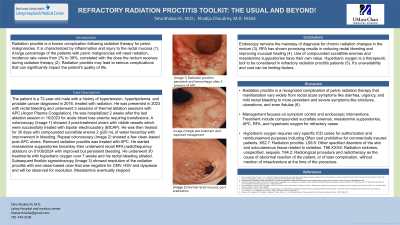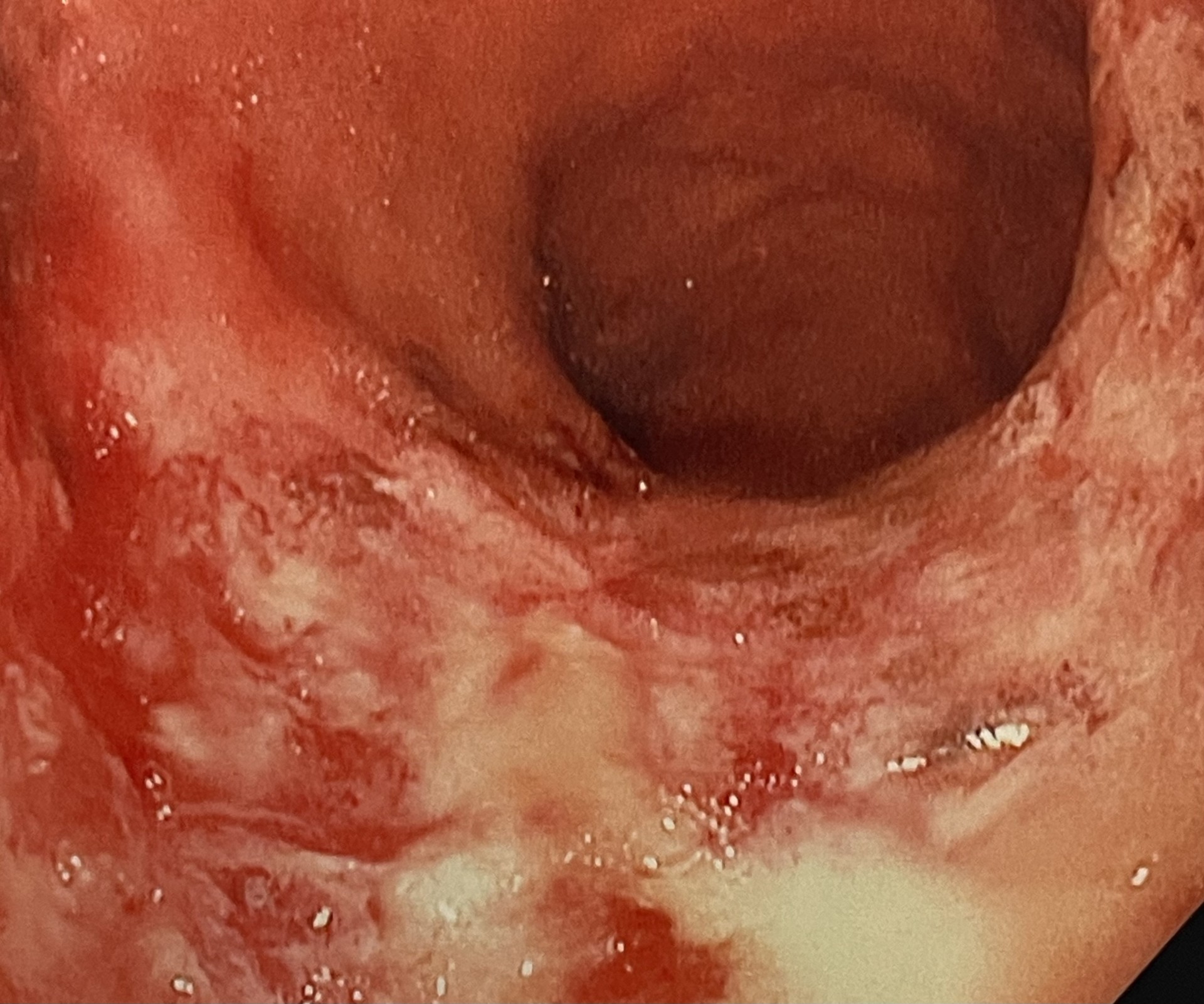Sunday Poster Session
Category: Interventional Endoscopy
P1124 - Refractory Radiation Proctitis Toolkit: The Usual and Beyond!
Sunday, October 27, 2024
3:30 PM - 7:00 PM ET
Location: Exhibit Hall E

Has Audio

Taha Shakarchi, MD, MBChB
Lahey Clinic
Burlington, MA
Presenting Author(s)
Taha Shakarchi, MD, MBChB1, Khadija Chaudrey, MD, FACG2
1Lahey Clinic, Burlington, MA; 2Lahey Hospital and Medical Center, Burlington, MA
Introduction: Radiation proctitis is a known complication following radiation therapy for pelvic malignancies, characterized by inflammation and injury to the rectal mucosa. Large percentage of the patients with pelvic malignancies will need radiation, incidence rate varies from 2% to 39%, correlated with the dose the rectum receives during radiation therapy. Radiation proctitis may lead to serious complications that can significantly impact the patient's quality of life.
Case Description/Methods: The patient is a 72-year-old male with a history of hypertension, hyperlipidemia, and prostate cancer diagnosed in 2016, treated with radiation. He presented in 2023 with rectal bleeding and underwent 3 sessions of thermal ablation sessions with APC (Argon Plasma Coagulation). He was hospitalized 2 weeks after the last ablation session in 10/2023 for acute blood loss anemia requiring transfusions. A colonoscopy showed 3 post-treatment ulcers with visible vessels which were successfully treated with bipolar electrocautery (BICAP). He was then treated for 30 days with compounded sucralfate enema 2 g/20 mL of water twice/day with improvement in bleeding. Repeat colonoscopy showed a few clean-based post-APC ulcers. Remnant radiation proctitis was treated with APC. He started mesalamine suppositories twice/day then underwent rectal RFA (radiofrequency ablation) on 01/08/2024 with improved but persistent bleeding. He underwent 30 treatments with hyperbaric oxygen over 7 weeks and his rectal bleeding ablated. Subsequent flexible sigmoidoscopy showed resolution of the radiation proctitis with one clean-based ulcer that was negative for CMV, HSV and dysplasia and will be observed for resolution. Mesalamine eventually stopped.
Discussion: Radiation proctitis is a recognized complication of pelvic radiation therapy that manifestation vary widely from rectal acute symptoms like diarrhea, urgency, and mild rectal bleeding to more persistent and severe symptoms like strictures, ulcerations, and even fistulas. Management focuses on symptom control, endoscopic interventions, and addressing associated complications. Endoscopy remains the mainstay of diagnosis for chronic radiation changes in the rectum. RFA has shown promising results in reducing rectal bleeding and improving mucosal healing. Use of compounded sucralfate enemas and mesalamine suppositories have their own value. Hyperbaric oxygen is a therapeutic tool to be considered in refractory radiation proctitis patients. It’s unavailability and cost can be limiting factors.

Disclosures:
Taha Shakarchi, MD, MBChB1, Khadija Chaudrey, MD, FACG2. P1124 - Refractory Radiation Proctitis Toolkit: The Usual and Beyond!, ACG 2024 Annual Scientific Meeting Abstracts. Philadelphia, PA: American College of Gastroenterology.
1Lahey Clinic, Burlington, MA; 2Lahey Hospital and Medical Center, Burlington, MA
Introduction: Radiation proctitis is a known complication following radiation therapy for pelvic malignancies, characterized by inflammation and injury to the rectal mucosa. Large percentage of the patients with pelvic malignancies will need radiation, incidence rate varies from 2% to 39%, correlated with the dose the rectum receives during radiation therapy. Radiation proctitis may lead to serious complications that can significantly impact the patient's quality of life.
Case Description/Methods: The patient is a 72-year-old male with a history of hypertension, hyperlipidemia, and prostate cancer diagnosed in 2016, treated with radiation. He presented in 2023 with rectal bleeding and underwent 3 sessions of thermal ablation sessions with APC (Argon Plasma Coagulation). He was hospitalized 2 weeks after the last ablation session in 10/2023 for acute blood loss anemia requiring transfusions. A colonoscopy showed 3 post-treatment ulcers with visible vessels which were successfully treated with bipolar electrocautery (BICAP). He was then treated for 30 days with compounded sucralfate enema 2 g/20 mL of water twice/day with improvement in bleeding. Repeat colonoscopy showed a few clean-based post-APC ulcers. Remnant radiation proctitis was treated with APC. He started mesalamine suppositories twice/day then underwent rectal RFA (radiofrequency ablation) on 01/08/2024 with improved but persistent bleeding. He underwent 30 treatments with hyperbaric oxygen over 7 weeks and his rectal bleeding ablated. Subsequent flexible sigmoidoscopy showed resolution of the radiation proctitis with one clean-based ulcer that was negative for CMV, HSV and dysplasia and will be observed for resolution. Mesalamine eventually stopped.
Discussion: Radiation proctitis is a recognized complication of pelvic radiation therapy that manifestation vary widely from rectal acute symptoms like diarrhea, urgency, and mild rectal bleeding to more persistent and severe symptoms like strictures, ulcerations, and even fistulas. Management focuses on symptom control, endoscopic interventions, and addressing associated complications. Endoscopy remains the mainstay of diagnosis for chronic radiation changes in the rectum. RFA has shown promising results in reducing rectal bleeding and improving mucosal healing. Use of compounded sucralfate enemas and mesalamine suppositories have their own value. Hyperbaric oxygen is a therapeutic tool to be considered in refractory radiation proctitis patients. It’s unavailability and cost can be limiting factors.

Figure: Persistent and hemorrhagic after 2 sessions of APC
Disclosures:
Taha Shakarchi indicated no relevant financial relationships.
Khadija Chaudrey indicated no relevant financial relationships.
Taha Shakarchi, MD, MBChB1, Khadija Chaudrey, MD, FACG2. P1124 - Refractory Radiation Proctitis Toolkit: The Usual and Beyond!, ACG 2024 Annual Scientific Meeting Abstracts. Philadelphia, PA: American College of Gastroenterology.
